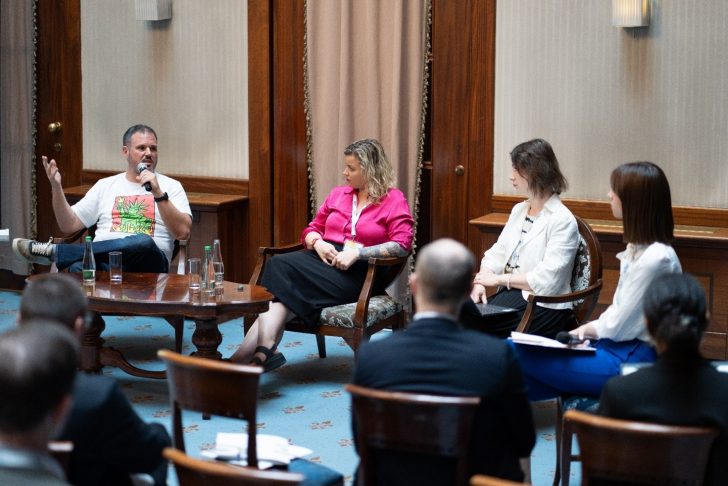Eurooppalainen yhteistyö ja informaation resilienssi Länsi-Balkanin maissa
Informaatiotilassa niin meillä Suomessa kuin maailmallakin käydään jatkuvaa neuvottelua siitä, kenen narratiivit tulevat kuulluiksi ja hyväksytyiksi. Länsi-Balkanilla Venäjän narratiivin vaikutus yleiseen mielipiteeseen on paikoitellen vahva samaan aikaan kun alue pyrkii asteittain yhdentymään Euroopan unioniin. Eurooppalainen yhteistyö onkin merkittävässä roolissa informaation resilienssin ja informaatioturvallisuuden sekä eurooppalaisten demokraattisten arvojen ylläpitämisessä.

Huoltovarmuusorganisaatioon kuuluva Mediapooli osallistui lokakuussa 2023 kahteen Länsi-Balkanilla järjestettyyn informaation resilienssiä tukevaan tapahtumaan Bosnia ja Hertsegovinassa sekä Serbiassa. Suomen huoltovarmuusmalli ja ainutlaatuinen Huoltovarmuusorganisaatiomme kiinnostavat nyt maailmalla. Itse voimme yhteistyön kautta saada uusia näkökulmia mediamaisemaan ja informaation resilienssiin eri Euroopan kolkissa. Slovenialaisen Centre for European Perspective -järjestön projektipäällikkö Petra Balažič ja Mediapoolin erikoistutkija Senni Jyrkiäinen kokosivat lokakuun tapahtumien antia englanninkieliseen yhteisartikkeliin.

From European cooperative to collective security: Why should we care about the information resilience of the Western Balkans?
International interdependencies are increasingly important for security of supply, as the National Emergency Supply Agency underlines in its objectives. Thus, strengthening security of supply requires participating in extensive international cooperation. This is also true for the media sector and information resilience. The Finnish model of security of supply and the activities of the pools are now of interest abroad. Could the Western Balkans benefit from a model of preparedness that has been developed in the far north? And in return, what lessons can we learn from the Western Balkans?
In October 2023, Mediapooli attended two counter-disinformation events in the Western Balkans. The events brought together media researchers and other experts from across Europe, as well as local journalists and civil society actors, to discuss strengthening societal resilience in the Western Balkans. The in-country events were organised by the Centre for European Perspective in the framework of the project ‘Strengthening Societal Resilience & Countering Foreign Perpetrated Disinformation in the Western Balkans.
Mediapooli’s mission is to ensure that the operating conditions of the Finnish news media and press freedom are secured in all situations. Moreover, Mediapooli has a long tradition of international cooperation. Our foreign partners are interested in our unique security of supply work and the role of the media in it. For our part, we gain insights into the different media landscapes and their challenges. The underlying idea is that European cooperation is critical as we work to strengthen information resilience and information security and to protect our European democratic values.
Why is Western Balkans important?
What happens in the Western Balkans does not stay in the Western Balkans. Security of the EU is tightly linked to the region. This is true for the security challenges such as illegal migration, illicit trafficking, and other forms of organized crime, for which Western Balkans region acts as a transit route between the MENA region and the European Union. [1] For example, out of 300.000 illegal crossing of European external borders in 2022, nearly 45% arrived through the Western Balkans route. [2] Moreover, weapons seized in numerous countries of the EU were identified as originating from the Western Balkans, [3] whereas the region’s criminal networks constitute some of the key players in the EU illicit drug market. [4]
These challenges that spill over directly into the EU do not occur in a vacuum. They are a direct consequence of not only the geographic positioning of the Western Balkans, but also of the still fragile rule of law systems and regional instability [5]. According to the Balkan Barometer public survey, only about a third of the Western Balkan population trusts their judiciary [6]. In Finland, 73% of the population trust the judiciary, according to the Kansalaispulssi survey (11/2023). [7] On average, countries of the Western Balkans score only 39 out of 100 points on the Transparency International’s Corruption Perception Index. In comparison, Finland – ranked second-best globally – scored 87 points in 2022. [8] And there is a lingering perception among the population of the Western Balkans that armed conflict between ethnic groups is still a possibility: nearly a half of SecuriMeter respondents are concerned about this threat. [9]
While the EU Member States should pay attention to the Western Balkans in the context of their own security, there is also another, more subtle yet equally important element at stake, and that is the normative power of the EU. The EU prides itself for its transformative capacity, positively influencing its prospective members to abide by the rule of law, European values and principles. For many actors on the global politics stage, Western Balkans are an important litmus test for the EU: if the EU will appear unable to bring a positive change and ensure safety and stability of a region that finds itself in the underbelly of the European continent, then its power of attraction will significantly lessen, opening the door to other players – such as Russia, China, and others.
In many ways, therefore, Western Balkans is not just a faraway region for Europe’s far north. It is the next-door neighbour who wishes, but struggles to join the community. A helping hand could go a long way, particularly if we do not want an immediate neighbour to fall under the negative influence of the ‘bad kids on the block’…
What do foreign information manipulations have to do with the Western Balkans – And the Western Balkans and the EU?
In Sarajevo and Belgrade, Mediapooli took part in several panels to exchange views on how Finland, Estonia, the EU and the Western Balkans support citizens’ access to reliable information. In international comparisons, Finland and Estonia are among the top countries for press freedom. In the 2023 Press Freedom Index, Finland and Estonia are ranked fifth and eighth respectively [10]. The good news is that there are double the number of countries in the EU that have risen in the newest Index than those that have fallen. Yet, Serbia experienced the biggest decline (-12) in the EU-Western Balkans region.
Foreign adversaries, in particular Russian state and state-affiliated actors, see the Western Balkans as an opportunity to destabilize the EU, both internally and in the eyes of the global public. Russian geostrategic interests benefit from continuous tensions between Belgrade and Pristina, the turmoil in Montenegro, the contested statehood in Bosnia and Herzegovina. Moscow has no intention of territorial occupation of this region – but by maintaining a strong presence in terms of discourse and narrative, it directly undermines the efforts of Transatlantic partners to bring the region into the Euro-Atlantic fold.
Unfortunately, Kremlin’s efforts have the capacity to impact public views and opinions. One example would be the public perception regarding economic influence. Economically, Russia is a weak player in the Western Balkans. Trade with the EU makes up two thirds of the region’s overall trade volume, and EU companies provide 61% of Foreign Direct investments in the region. However, Russian outlets operating in the local language, such as RT Balkan and Sputnik Serbia, are so successful in their messaging that few of the Western Balkan citizens name the EU as their countries’ key economic partner [11].
The information manipulation in favour of Russian narrative, while consistently strong even prior to the Russian invasion of Ukraine, increased further after February 2022. It likely contributed significantly to the Western Balkans respondents’ view that their country should not enforce or continue to enforce sanctions against Russia – on average, 44% of citizens of the Western Balkans do not support sanctions in 2023, although this opinion varies between countries. The sentiment is strongest in Serbia (65% are against sanctions) and weakest in Albania (90% support sanctions) [12]. On the other hand, in countries that are successful in countering foreign information manipulations, such as Finland, support for Ukraine is strong and unequivocal. According to the latest Kansalaispulssi survey (11/2023), 85% of Finns agree that they approve of the economic sanctions imposed by the EU on Russia, even though they could cause significant damage to Finland [13].
In order to make inroads into the hearts and minds of the Western Balkan population, Russia plays into the noted structural deficiencies and weaknesses of the region’s countries. The long path to the EU and the sense that EU accession is a distant, if at all realistic possibility, makes the Western Balkans susceptible to Russian-sponsored narratives that the EU is weak, incapable of making political decisions, an unconvincing guarantor of stability and a destroyer of traditional values. Combined with a growing sense that ’nothing ever changes’ and with the emigration rate of about 10% [14], such narratives disincentivize the popular push for reforms and political accountability. In turn, security challenges mentioned above remain unchecked or even worsen, and the EU’s normative power depletes.
What did the visit to Western Balkans teach us?
In the current geopolitical reality, Finland’s model of comprehensive security, of which preparedness is a key element, is attracting international interest. Investing in and nurturing better prospects for the Western Balkans is crucial for the efforts to undermine Russian, and other malign foreign influences in the region. A key element in this is for the EU and the EU Member States to unequivocally reaffirm the EU perspective of the Western Balkans, not only with economic, but also with strong political support.
In the meantime, there are sectoral issues that deserve particular attention and call for enhanced cooperation. One such issue is media literacy and critical thinking. Whereas Finland tops the Media Literacy Index 2023, all Western Balkan countries find themselves in the two bottom-most clusters. [15] 47% of the Western Balkans citizens are not confident that they would be able to identify news that misrepresent reality. [16]
When it comes to countering foreign perpetrated disinformation, there is also the question of the level of government awareness, capacities and structural mechanisms that would enable a successful national struggle against disinformation. Good practice examples exist in a number of EU Member States, including Finland, Sweden, Estonia and Lithuania, to name a few. Peer-learning, buttressed by the support of EU institutions such as EEAS, would significantly contribute to national preparedness to face the common threat. The more resilient Europe is, the stronger we are together.

Writers
Petra Balažič is a Project Manager with the Centre for European Perspective, a Slovenian non-profit organisation, where she is leading the project ‘Strengthening Societal Resilience and Countering Foreign Perpetrated Disinformation in the Western Balkans’. She holds an MSc in Theory and History of International Relations from the London School of Economics and is currently enrolled in the Doctoral Programme in Security Studies at the University of Ljubljana.
Dr. Senni Jyrkiäinen is a Senior Researcher at Mediapooli, focusing on media resilience and information security. Senni holds a PhD from the Faculty of Social Sciences at the University of Helsinki. Her research and studies have taken her around the world, including the Middle East. Senni’s previous research interests include social media and digital participation, navigating uncertainty and societal turbulence, as well as migration.
Kuvat: Maria Miklas ja Senni Jyrkiäisen arkisto
[1] Amerhauser, K., Kemp, W. and Scaturro, R. “Spot Prices: Analyzing flows of people, drugs and money in the Western Balkans”. Global Initiative Against Transnational Organized Crime. May 2021. [online access]
[2] Mirosavljević, I. “After illegal entries doubles in 2022, emigration from the Western Balkans again in EU’s focus”. European Western Balkans. 27 March 2023. [online access]
[3] Risk Bulletin #2 – October-November 2022.“Illicit weapons in the Western Balkans: a threat to Europe”. Global Initiative Against Transnational Organized Crime. [online access]
[4] European Monitoring Centre for Drugs and Drug Addiction. “Drug-related health and security threats in the Western Balkans, regional report”. 2022. [online access]
[5] United Nations Office on Drugs and Crime. “Measuring Organized Crime in the Western Balkans”. UNODC Research. 2020. [online access]
[6] Balkan Barometer. Regional Cooperation Council. 2023. [online access]
[7] Kansalaispulssi. Valtioneuvoston kanslia. 2023. [online access]
[8] Corruption Perceptions Index. Transparency International. 2022
[9] SecuriMeter. Regional Cooperation Council. 2023. [online access]
[10] 2023 World Press Freedom Index. Reporters Without Borders. 2023. [online access]
[11] “2022 Western Balkans Regional Survey, January – February 2022”. International Republican Institute. 29 June 2022. [online access]
[12] SecuriMeter. Regional Cooperation Council. 2023. [online access]
[13] Kansalaispulssi. Valtioneuvoston kanslia. 2023. [online access]
[14] “Labour Migration in the Western Balkans: Mapping Patterns Addressing Challenges and Reaping Benefits”. OECD. 2022. [online access]
[15] Lessenski, M. ”The Media Literacy Index 2023: Measuring Vulnerability of Societies to Disinformation”. Open Society Institute – Sofia. 2023. [online access]
[16] SecuriMeter. Regional Cooperation Council. 2023


